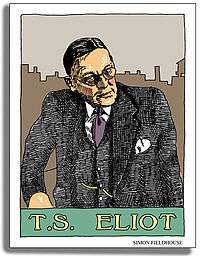Eliot family (America)
- For the British noble family of St Germans, Cornwall, see Earl of St Germans
The Eliot family is the American branch of one of several British families to hold this surname. This branch is based in Boston but originated in East Coker, Yeovil, Somerset. It is one of the Boston Brahmins, a bourgeois family,[1] whose ancestors had become wealthy and held sway over the American education system. All are the descendants of two men named Andrew Eliot, father and son, who emigrated from East Coker to Beverly, Massachusetts between 1668 and 1670. The elder Andrew (1627-March 1, 1703/04) served the town and colony in a number of positions and in 1692 was chosen as a juror in the Salem witch trials. His son Andrew (1651-September 12, 1688) married Mercy Shattuck in 1680 in Beverly and died by drowning after falling off a ship.
The ranks include several college presidents, one Nobel prize winner, and presidents of American professional associations. Charles W. Eliot transformed Harvard from a college to a research institution, a model which many American universities have followed. William Greenleaf Eliot was a co-founder of Washington University in St. Louis and Thomas H. Eliot was chancellor of that institution from 1962-71. The poet T. S. Eliot moved to England and his ashes were interred in East Coker, England. He wanted to be laid to rest in the original birthplace of his first American ancestor and other Eliot ancestors.
Another branch of the American Eliot family descend from Rev. John Eliot of Roxbury, Massachusetts, known as the “Apostle to the Indians.” His son, John Eliot, Jr., was the first pastor of the First Church of Christ in Newton. In turn, John Eliot Jr.'s son, Joseph Eliot, became a pastor in Guilford, Connecticut, and later fathered Jared Eliot, another pastor as well as agricultural writer.
Andrew Eliot's Descendants
Well-known descendants of Andrew Eliot include:
- Andrew Eliot, prominent Boston Congregational minister
- Charles Eliot, landscape architect and son of Charles William Eliot, uncle of Thomas H. Eliot
- Charles Eliot Norton, American scholar and man of letters. He was first cousin to Charles William Eliot.
- Charles William Eliot, President of Harvard University, son of Samuel Atkins Eliot
- Rev. Christopher Rhodes Eliot, Unitarian minister and author, son of William Greenleaf Eliot.
- Edward Cranch Eliot[2] President of the American Bar Association
- Frederick May Eliot, President of the American Unitarian Association from 1937–1958, son of Christopher Rhodes Eliot.
- Henry Ware Eliot, businessman and President of the Academy of Science, St. Louis, son of William Greenleaf Eliot.
- John Eliot, co-founder of the Massachusetts Historical Society with Jeremy Belknap, the first such Historical Society of its kind, and son of Andrew Eliot.
- Martha May Eliot, a pediatrician and expert in public health; she served as director of the Children’s Bureau’s Division of Child and Maternal Health in the 1920s and 1930s, and is credited with drafting language on women and children in the Social Security Act. Martha May Eliot lived a quiet but public life as a lesbian with her lifelong domestic partner, Ethel Collins Dunham. She was a daughter of Christopher Rhodes Eliot.
- Samuel Eliot (banker), Boston banker and merchant
- Samuel Atkins Eliot, politician who served in the United States House of Representatives, Massachusetts House of Representatives, Massachusetts Senate and was also mayor of Boston and treasurer of Harvard University. Son of Samuel Eliot and father of Charles William Eliot.
- Samuel Atkins Eliot II, President of the American Unitarian Association from 1900–1927, son of Charles William Eliot
- Samuel Atkins Eliot, Jr., American novelist, son of Samuel Atkins Eliot II
- Samuel Eliot, historian, educator, trustee of Massachusetts General Hospital, Museum of Fine Arts (Boston), the American Academy of Arts and Sciences and the Massachusetts Historical Society. He was the cousin of Charles Eliot Norton.
- Samuel Eliot Morison, historian, Rear Admiral, United States Naval Reserve. He was the grandson of Samuel Eliot.
- Thomas Dawes Eliot, U.S. Congressman from Massachusetts. Brother of William Greenleaf Eliot.
- Thomas H. Eliot, Chancellor of Washington University in St. Louis, U.S. Congressman, son of Samuel Atkins Eliot II
- Rev. Thomas Lamb Eliot, Regent and Trustee of Reed College. Son of William Greenleaf Eliot.
- Thomas Stearns Eliot (better known as T. S. Eliot), Nobel prize winner, poet, playwright, literary critic and publisher. Son of Henry Ware Eliot.
- Theodore Lyman Eliot I, president of San Francisco Art Institute, grandson of Charles William Eliot, brother of Thomas H. Eliot and Samuel Atkins Eliot Jr, father of Theodore Lyman Eliot II. His brother-in-law was Albert Bigelow, the peace activist.
- Theodore Lyman Eliot II (United States Ambassador to Afghanistan, 1973–1978), nephew of Thomas H. Eliot and Samuel Atkins Eliot Jr, great-grandson of Charles William Eliot, great-great grandson of Samuel Atkins Eliot. Charles Eliot, the landscape architect, was his great-uncle.
- William Greenleaf Eliot, co-founder and third chancellor of Washington University in St. Louis
- Edward Samuel Ritchie, American inventor and physicist, great-grandson of Andrew Eliot, the Boston minister
References
- The Family of William Greenleaf Eliot and Abby Adams Eliot of St. Louis, Missouri: 1811-1931 by Henry Ware Eliot, Jr. (c. 1931)
- The Family of William Greenleaf Eliot and Abby Adams Eliot, as Chronicled by their Descendants, to 1988 by Henry Eliot Scott (1988)
- Asticou Foreside, genealogy written by Charles W. Eliot II, 1981
- The Genealogy of the Somerset branch of the American Eliot Family
- Cynthia Grant Tucker, No Silent Witness: The Eliot Parsonage Women and their Unitarian World, Oxford University Press, 2010, 344 pp.
- A Sketch of the Eliot Family by Walter Graeme Eliot, Press of Livingston Middleditch, New York, 1887 Online at the Library of Congress
Citations
- ↑ T.S. Eliot: the modernist in history, (New York, 1991) By Ronald Bush, page 72
- ↑ I14: Edward Cranch ELIOT (3 JUL 1858 - 2 APR 1928)
| ||||||||||||||||||||||||||||||||||||||||||||||
